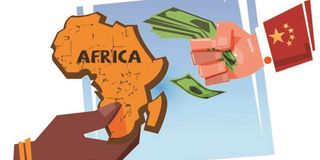Expo great boost to China-Africa economic cooperation

A graphical illustration of China-Africa economic relations.
The second China-Africa Economic and Trade Expo (CAETE) came to a close on September 29, in the Chinese city of Changsha with 135 projects worth US$ 22.9 billion sealed in areas such as trade, investment, infrastructure, agriculture, manufacturing, aviation, and tourism.
These excellent outcomes further consolidate the legacy of the platform which is primed to foster Sino-Africa ties in the trade and economic arena. Mooted by President Xi Jinping during the 2018 Forum on China-Africa Cooperation (FOCAC), the Expo has expanded in scope, drawing in more firms from an increasing number of countries in the continent.
Besides the business deals signed, 320 companies showcased their products at the event which netted US$ 38.7 million in an online trading stint; revealing the role that technology can play in facilitating trade relations in the backdrop of travel cuts occasioned by the Covid-19 global health crisis. About 900 firms from 40 countries participated in the event, compared to 700 companies that took part in the inaugural CAETE held in 2019.
China has maintained its lead position as Africa’s largest trade partner for 12 years straight, having displaced the United States in 2009. This year, bilateral trade between China and the continent defined pandemic pressure - rising 40.5 percent year on year to hit US$ 139.1 billion in the first seven months.
With Six African countries namely Kenya, Algeria, Ethiopia, Rwanda, South Africa and Senegal headlining the Expo as guests of honour, the Expo signaled new opportunities as the continent raced to firm up its trade and investment ties with Beijing towards a more balanced outcome.
It was gratifying to see more agricultural produce from Africa gaining access to the Chinese markets after elimination of restrictive entry barriers that only saw crude oil, timber copper, iron and other rare minerals making it to the list of imports from the continent.
Agricultural products
A wide array of agricultural products from Africa was on display at the Expo ranging from Kenyan tea to Rwandan coffee and South African blueberries. Kenya and China have for example signed formal Sanitary & Phytosanitary agreements clearing a list of products for export to China such as legumes, flowers, vegetables, meat, hides, herbs and fruits.
Kenyan firms that participated in the Expo reported a ready Chinese market, longing for the African products; an enviable outcome of the targeted marketing and visibility of the few items exhibited at the CAETE.
To fully tap into the Chinese market, a number of things need to be done by both China and African countries. Top of the list regards product quality. China has opened its trading rooms to all countries around the world. African products therefore compete with products from other parts of the world. African firms should incrementally enhance product qualities to meet and exceed thresholds set by China.
Secondly, in order to fulfill the product quantities demanded in China, there is an urgent need to expand Africa’s production capacities, which needs resources that are often not available to many of the small and medium enterprises involved in the export market.
The increasing interests from Chinese enterprises and investors to partner with African counterparts can significantly ease this funding shortage.
Thirdly, African firms should aggressively market new sources of comparative advantage such as tourism to the Chinese market. The continent is proving popular with the growing number of Chinese tourists; something that could provide the much needed shot in the arm as the world climbs out of the pandemic afflictions.
Finally, on the export/import regulations, both China and African countries should reduce or altogether eliminate existing trade tariffs in order to enhance accessibility of both markets. During the 2018 FOCAC Summit in Beijing, China pledged US$5 billion to support African imports into the country.
The upcoming FOCAC should also ground new and innovative ways to further enhance flow of imports into both Chinese and African markets that now boasts a combined population in excess of 2.5 billion people.
Twitter: @Cavinceworld.





